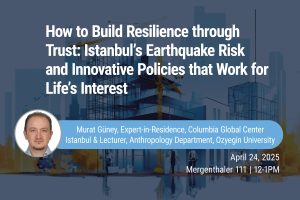
Murat Güney, Expert-in-Residence for Columbia Global Center
Istanbul and Lecturer in the Anthropology Department at Ozyegin University, will give a talk titled “How to Build Resilience through Trust: Istanbul’s Earthquake Risk and Innovative Policies that Work for Life’s Interest.”
Abstract
1999 Marmara earthquake near Istanbul claimed tens of thousands of lives and destroyed hundreds of thousands of buildings. While this disaster triggered significant research and new building codes, these measures were not consistently enforced. After 24 years, this lack of preparation resurfaced in the 2023 Maras earthquakes in the southeast of Turkey, which led to large-scale devastation, even among newer buildings, some of which had been advertised as earthquake-resilient but still collapsed, undermining public trust.
This talk will discuss how to build resilience through building trust, because what collapsed in the 2023 earthquake was not only buildings but also the trust in public institutions. The collapse of trust in public institutions is a core issue hindering disaster preparedness. The talk will also discuss the power of political decisions taken and not taken over life and death, by disclosing the possibility of alternative policies that might work for life’s interest, yet are not implemented. The talk will introduce ongoing alternative and innovative resilience building projects in the earthquake-hit regions of Turkey supported by Columbia Global’s new Resilience Fund.
Bio
Murat Güney is a social scientist and an urban researcher. He received his PhD degree in anthropology from Columbia University, and BA double major degrees in sociology and political science and international relations from Boğaziçi University. His research interests include urban resilience, earthquakes and anthropology of disasters, disaster preparedness and recovery, housing inequality, mega-projects and urban infrastructures, social policy, wealth and income inequality.
Previously, Murat worked as a researcher and coordinator at Istanbul Planning Agency, where he collaborated with policy makers, members of NGOs and community groups; and developed policy proposals to make the largest city of Europe more resilient to earthquakes, disasters, and public health risks. He taught courses in the anthropology departments at Boston University and Özyeğin University, and sociology departments at İstanbul Bilgi University and Acıbadem University. He also collaborated in international research projects on housing inequality as a postdoctoral researcher in the City Institute at York University.